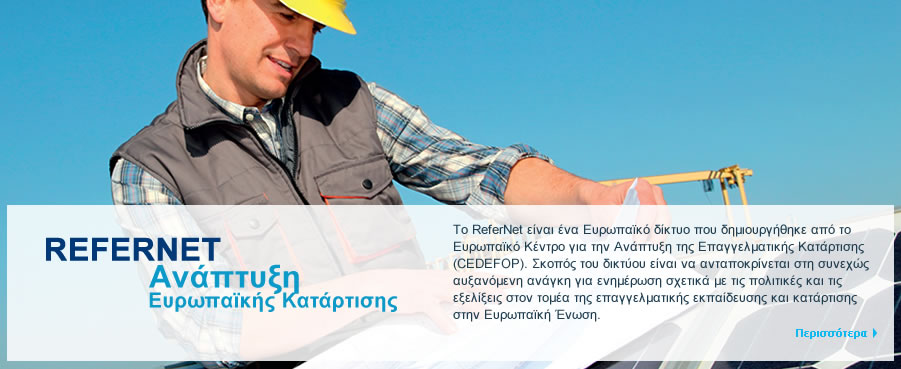 A Major Resource for a Small Economy (1/2004)-EN
A Major Resource for a Small Economy (1/2004)-EN
A Major Resource for a Small Economy (1/2004)-EN
Continued reform with increased participation
Cyprus has a small and open economy with limited natural resources. Growth demands investment to develop its most important asset: its human resources.
Education levels in Cyprus have risen dramatically in recent times, with fewer Cypriots now without any education. Participation by 12-17 years olds is estimated at over 90 % and there is a strong leaning towards general and higher education. Approximately 85% of upper secondary students are in general education while 15% opt for VET programmes. More than two thirds of secondary education graduates continue on to tertiary studies. Upper secondary education has undergone reform to respond to the labour market and knowledge-based society. This has been fully implemented in upper secondary general education and is currently being evaluated.
VET reform, approved in 2000 with the aim of modernising curricula and providing easier progression to higher education from technical and vocational areas, is entering its final stage and is being closely monitored. Transfer between general and technical and vocational education programmes will also be easier, with VET elements becoming more attractive through student-centred learning, new programmes (e.g. for the service sector) and more practical training.
The human resource development authority (HRDA), as the main promoter of initial out of school and continuing vocational training, ensures a wide range of training schemes in all sectors of the economy and at all levels. The number receiving training has increased over the years to 11% of the employed population ((34 400 during 2003). Approximately 17 000 participate in programmes organised by education centres for adults. Evaluating labour market characteristics, the training sector and the challenges of EU accession, reveal that significant progress has been made in training within recent years. Businesses and employees increasingly see the importance of training and lifelong learning.
Seeking broader scope, demanding flexibility
A more comprehensive approach to lifelong learning is needed. Analysis of education, training and the labour market indicate policy priorities for the coming years.
First is a focus on those not in employment, providing training and employment opportunities. Even though adults can acquire formal qualifications and/or upgrade their skills, options for the unemployed are limited. Guidance and counselling is confined to filling vacancies. Provision for vulnerable groups is important, especially for females, the disabled and secondary education graduates who cannot find jobs. There are few opportunities for those who drop out of school, particularly for girls; this requires attention if the 2000 school dropouts each year are to be brought back into education, training and eventual employment.
Enhancing flexibility, quality, range and responsiveness in technical-vocational education and training is also important. Training in any of its forms, (formal, non-formal, initial, continuing, private, public) must support employability and adaptability in available human resources to contribute to Cypriot economic competitiveness . Currently, links between initial and continuing vocational training are weak. National occupational standards need to be developed. These could form the framework for what is lacking: an integrated approach to formal recognition of competences, whether acquired through secondary technical and vocational education, continuing vocational training, experience-based or through apprenticeship.
 Index List for Siblings
Index List for Siblings
-
Cyprus: HRDA study identifies green skill needs in the Cyprus economy 2017-27 (1/2018)-EN
In March 2018 the Human Resource Development Authority of Cyprus (HRDA), published a study ...
-
Cyprus - Employment forecasts 2017-27 (4/2017)-EN
The systematic monitoring of employment trends over time and projecting the future situation of the ...
-
Youth Board of Cyprus programmes for Active Youth and Youth Entrepreneurship Development (3/2017)-EN
In an effort to support young persons in Cyprus, the Youth Board of Cyprus implements two distinct ...
-
Cyprus: Accreditation and upgrading of the Post-Secondary Institutes of Vocational Education and Training (2/2017)-EN
The post-secondary institutes of vocational education and training (PSIVET) were accredited in ...
-
Adoption of the first National Youth Strategy for Cyprus (1/2017)-EN
The National Youth Strategy (NYS) of Cyprus 2017-2022 was prepared by the Youth Board of Cyprus ...
-
Vocational Skills Week Events in Cyprus (4/2016)-EN
Events that included round table discussions and an open day were organised in Cyprus, during the ...
-
Reform and Upgrading of the Apprenticeship Scheme (New Modern Apprenticeship) of Cyprus (3/2016)-EN
The Apprenticeship Scheme (New Modern Apprenticeship) of Cyprus is being upgraded and reformed in ...
-
Evaluation of the Impact of the Schemes for Job Placement of Unemployed Young Persons for the Acquisition of Work Experience in Enterprises/Organisations implemented by the Human Resource Development Authority of Cyprus (12/2015)
In order to evaluate the impact of its activities, the Human Resource Development Authority of ...
-
Identification of blue skill needs in the Cyprus economy 2016-26 (2/2016)-EN
The Human Resource Development Authority of Cyprus (HRDA), included the blue economy in its ...
-
Reform of the Vocational Education and Training System of Cyprus (1/2016)-EN
The public Vocational Education and Training System of Cyprus is being upgraded and reformed in ...
-
Employment forecasts in Cyprus 2014-2024 (4/2015)
The provision of long-term employment forecasts in sectors of economic activity and occupations is ...
-
Evaluation of the Impact of Activities of the Human Resource Development Authority of Cyprus (12/2014)
Responding to the adverse effects of the economic crisis on the labour market, the Human Resource ...
-
Cyprus Lifelong Learning Strategy for the period 2014-2020 (9/2014)
The persistent economic crisis and its adverse effects on the labour market, which include high ...
-
Promoting Green Skills in the Cyprus Economy (2/2012)-EN
The Human Resource Development Authority of Cyprus (HRDA) recognised the necessity for the ...
-
Promoting Green Skills in the Cyprus Economy (1/2011) -EN
The Human Resource Development Authority of Cyprus (HRDA) has conducted a study entitled ...
-
Employment Forecasts in Cyprus 2010-2020-EN
The provision of long-term employment forecasts in sectors of economic activity and ...
-
Development of a Competence-Based System of Vocational Qualifications in Cyprus -EN
The development of a Competence-Based System of Vocational Qualifications is a high priority ...
-
Completion of Projects Co-financed by the ESF
The end of 2008 marked the ...
-
Strategy of the Operational Programme “Employment, Human Capital and Social Cohesion” 2007-2013 for Cyprus (3/2008)-EN
The Operational Programme «Employment, Human Capital and Social Cohesion», is a multiannual ...
-
Employment Forecasts in Cyprus 2008-2018-ΕΝ
The provision of long-term employment forecasts in sectors of economic activity and occupations has ...
-
Elaboration of a Lifelong Learning Strategy for Cyprus 2007-2013 (1/2008)-EN
The elaboration of a comprehensive Lifelong Learning (LLL) Strategy for Cyprus has been one of the ...
-
Human Capital Development is at the Forefront of the New National Productivity Strategy for Cyprus (3/2007)-EN
The Government of Cyprus attaches great importance in increasing the productivity levels in Cyprus ..
-
The thematic priority “Human Resources and Social Cohesion” features prominently in the NSRF 2007-2013 for Cyprus (2/2007)-ΕΝ
The Cyprus National Strategic Reference Framework for Cohesion Policy 2007-2013 (NSRF) was ...
-
Forecasts of Employment Needs for Nursing Staff in Cyprus 2005-2015 (3/2006)
Nursing Staff has a significant and indispensable role to play in the provision of high-quality ...
-
Progress Towards the Development of a Life Long Learning Strategy for Cyprus (3/2006)-EN
State of development until September 2006 The elaboration of a comprehensive Life Long ...
-
Highlights of Education and Training Priorities in the National Lisbon Programme for Cyprus (2/2006)-EN
Highlights of Education and Training Priorities in the National Lisbon Programme for Cyprus As ...
-
National Lisbon Programme of Cyprus (1/2006)-EN
Cyprus prepared the National Lisbon Programme, as envisaged by the European Council in order to ...
-
Launching Europass in Cyprus (1/2006)-EN
Mr. Christos Taliadoros, Minister of Labour and Social Insurance officially launched Europass, a ...
-
Feasibility Workshop on European Skill Needs Forecasting (1/2006)-EN
The Human Resource Development Authority of Cyprus in the framework of its participation in the ...
-
Presenting ReferNet in Cyprus (1/2006)-EN
On an annual basis the Human Resource Development Authority of Cyprus (HRDA) conducts a meeting ...
-
Employment Forecast Studies Cover Wide Spectrum (3/2005)-EN
The Human Resource Development Authority of Cyprus recently published three research studies ...
-
Education Reform Widely Debated (2/2005)-EN
On 30 January 2005, the President of the Republic of Cyprus officially launched a public dialogue ...
-
Employability and Opportunity in Cyprus? (1/2005)-EN
Employability and Opportunity in Cyprus? (1/2005) The Community Initiative Programme (CIP) ...
-
Cyprus Contribution to the Enlargement Dossier (2004)-EN
Introduction For a small and open economy with limited natural resources, like the Cyprus ...
-
A Major Resource for a Small Economy (1/2004)-EN
Continued reform with increased participation Cyprus has a small and open economy with limited ...
-
Boosting Vocational Training Capabilities (3/2003)-EN
Encouraging and supporting lifelong learning as a strategic goal. This has led the Human Resource ...

